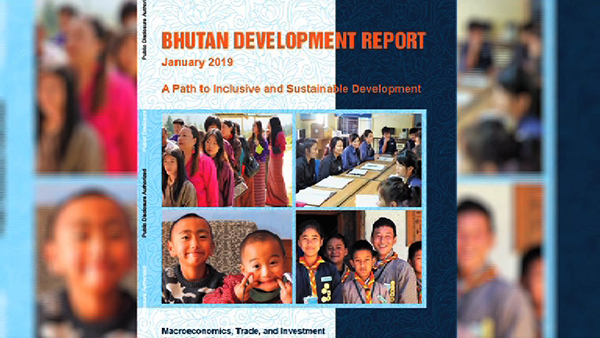 Growth driven by investments in the hydropower sector, state dominance in the economy, and dependence on hydropower has resulted in a weak private sector. This, as per the World Bank’s Bhutan Development Report, is despite the Government’s efforts to improve the private sector through infrastructure development and improvements in the investment climate.
Growth driven by investments in the hydropower sector, state dominance in the economy, and dependence on hydropower has resulted in a weak private sector. This, as per the World Bank’s Bhutan Development Report, is despite the Government’s efforts to improve the private sector through infrastructure development and improvements in the investment climate.
The report also states that despite laudable investments, available jobs remain vacant, while educated youth remain unemployed.
The report identifies Bhutan’s hydropower sector as an asset base and lays down recommendations to tap the revenue and resources from the hydropower sector to diversify Bhutan’s economic development.
The report also states that foundations for sustained private sector driven growth will be laid if Bhutan can diversify its asset base.
“In the medium term, five years, six years term we expect more hydropower-related inflows coming to Bhutan. How to use that money is a critical issue for Bhutan. If that revenue is used just for consumption, money will simply disappear,” Yoichiro Ishihara, the Resident Representative of World Bank Bhutan Country Office, said.
“If Bhutan uses that money for investing in people, investing in infrastructure, and while managing the macroeconomic policy very well, Bhutan will be able to set up a strong foundation for economic diversification.”
Private sector development, the report states, has been hindered by the existence of a large number of state-owned enterprises. Together with Bhutan’s small domestic market, sparse population, high transportation costs, and risks associated with private investments, the sector’s growth have been sluggish.
The report also outlines that state dominance of the economy has led to a lack of competition. It states, “the strong linkages that exist between policy makers and managers of state-owned enterprises inhibit a level playing field and may discourage private investment.”
It continues to state that, “the mandate of the Druk Holding and Investments in providing feedback to the Ministry of Finance creates a de jure conflict of interest that may discourage private investment.”
Quality mismatch in the labour market, in terms of the skilled labour shortage, was also highlighted in the report.
“One reason for that is Bhutan’s education system doesn’t generate students or graduates that the private sectors want to have. It can be easily addressed. For example, if we create the type of people that the private sector wants to have, they need to have certain skills and certain experience and Bhutan’s education can be easily adjusted based on the demand from the private sector,” the Resident Representative Yoichiro Ishihara said.
The report in its recommendations, calls the government to formulate a state-owned enterprise policy to redefine the role of SOEs to enable private sector development.
It also calls out to invest in human and physical capital using hydropower revenue for macroeconomic stability.
Investment in critical information and communication technologies and speedy implementation of a new tax regime, the goods and services tax has also been cited to enhance the private sector.












